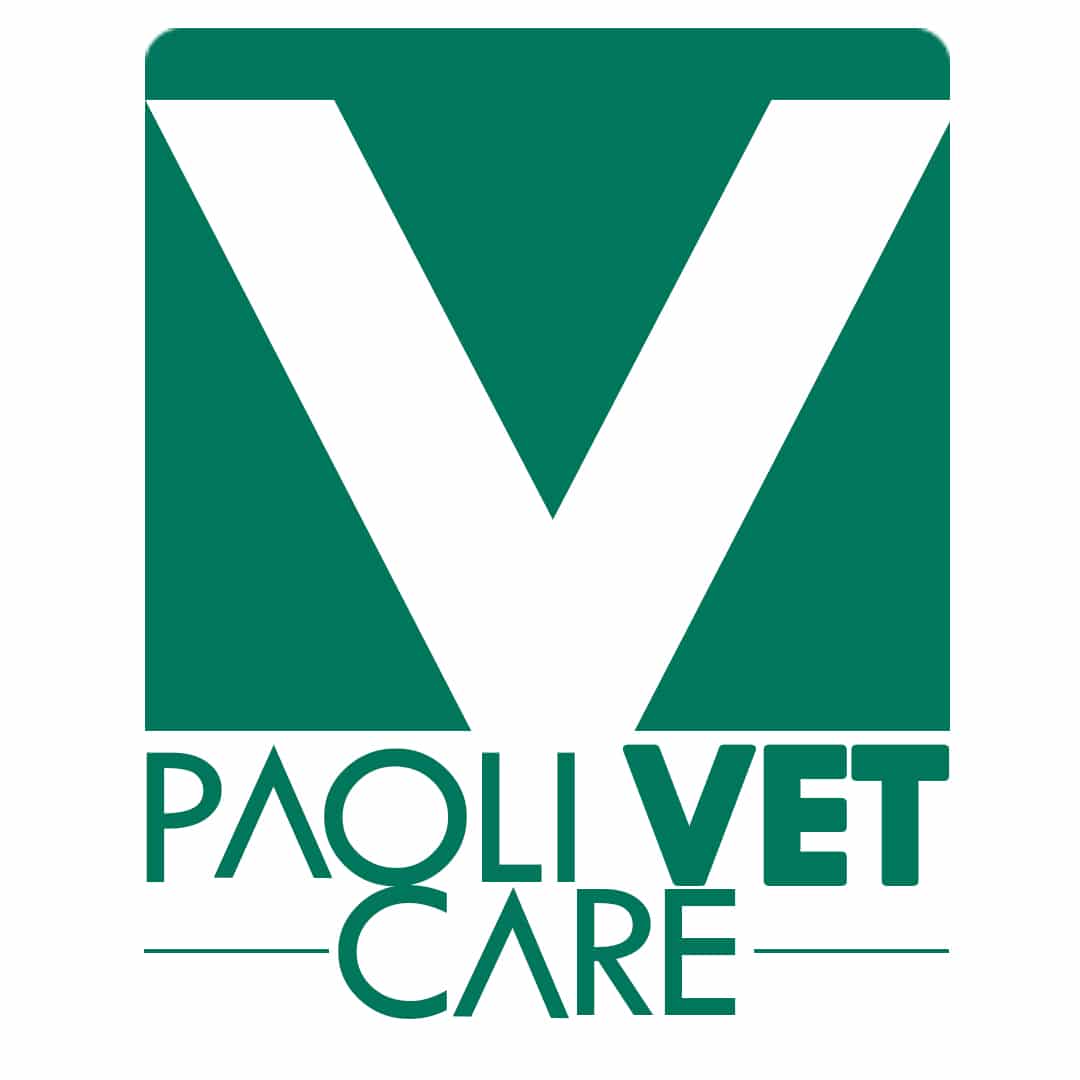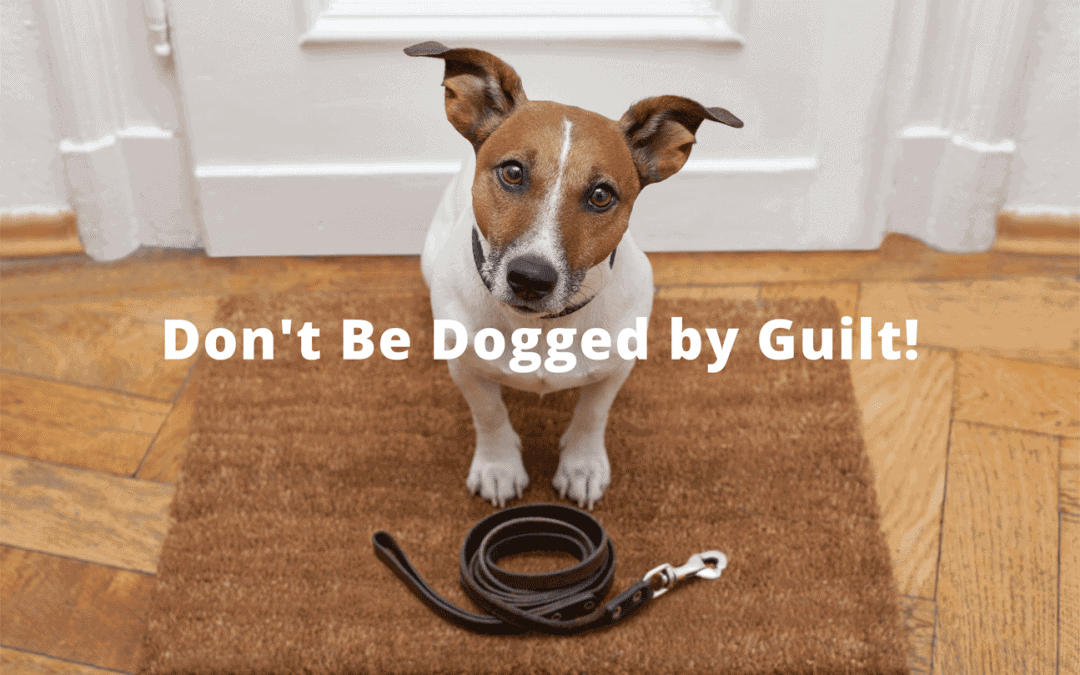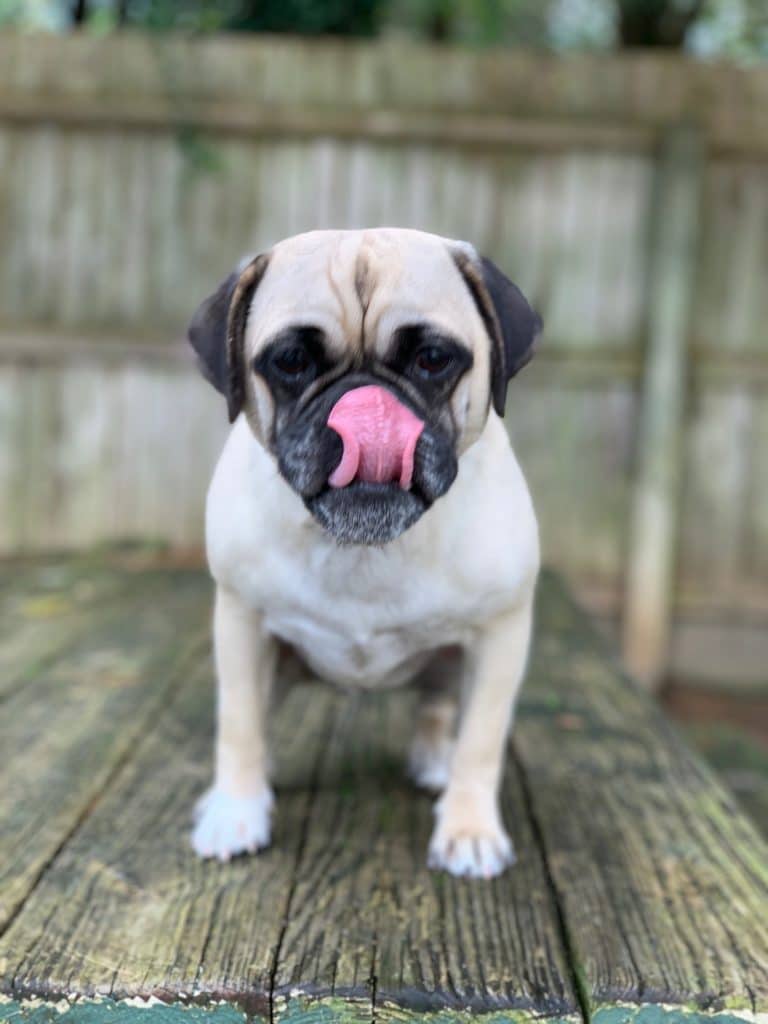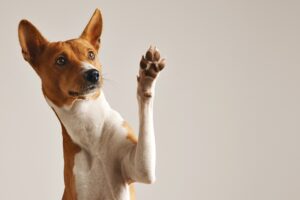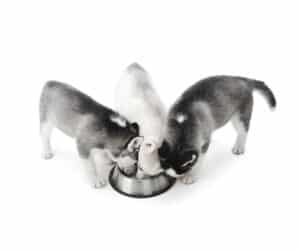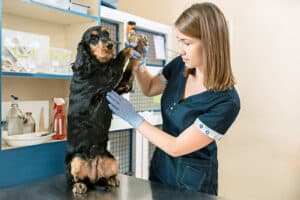Get Answers Quickly —
Table of Contents
People Worry They’re Failing their 4-Legged Friends
A large survey by a UK pet insurer found that 1 in 4 dog parents and 1 in 5 cat parents fear their vet personally judges how well they care for their pet. Are you biting your nails while the vet is trimming your pet’s? If so, what do you feel guilty about? Many people worry about whether their dog is overweight.
Most dog owners worry about lack of exercise. Cat owners most often stress about inadequate companionship. Interestingly, Millennials are twice as likely as Baby Boomers to think their vet believes they are an inadequate pet parent.
Other reasons for pet parent anxiety includes worries about poor grooming and dog walks that are too short, infrequent, or boring. Three-quarters of dog owners wish they could give their dogs more interesting walks. We feel guiltier as the number of hours a pet is home alone increases. A surprising finding is that nearly 1 in 5 Baby Boomers never leave their dog home alone! The big, take-home message from this survey is that more people than not fret that they’re not doing enough for their fur-babies.
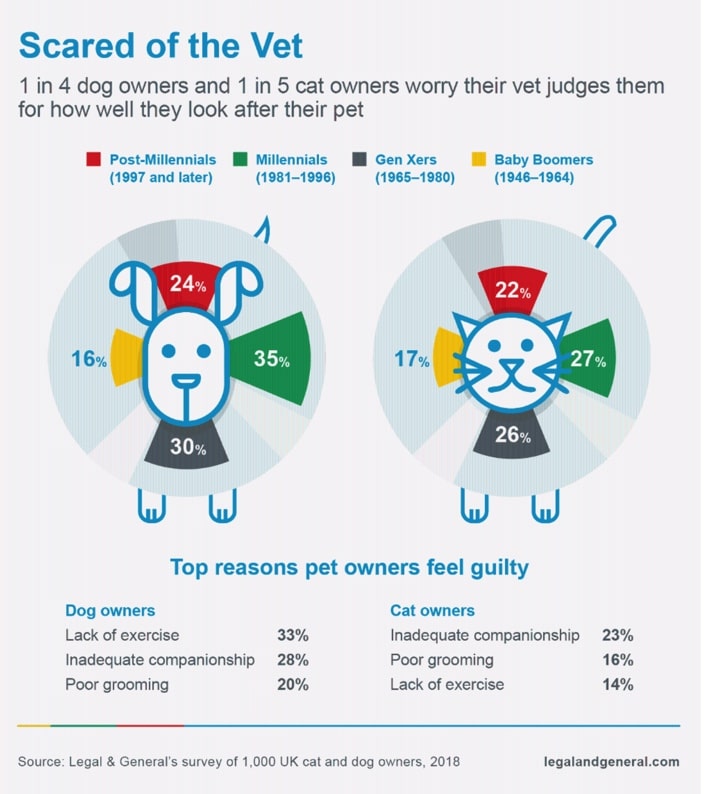
Always the Best Intentions
At Paoli Vetcare, we’re fortunate to have pet owners that take the best possible care of their dogs and cats. Clients always consider their pet as a member of the family. Our vets and staff celebrate the human-animal bond and hope never to induce guilt over pet care. Your pet has a unique personality with their own preferences and needs. You have a busy life and do your best to balance all your responsibilities. Only you know how to best manage all these contingencies. Even veterinarians worry that their dogs aren’t getting enough exercise or that their cats need more one-on-one playtime. We don’t ever want a pet owner to feel judged. And we certainly hope no patient or pet owner is ever scared of the vet!
Pet Obesity and the Misperception Dilemma
There is no shortage of stories and blog posts about overweight dogs, fat cats, and “The Pet Obesity Epidemic,” and most owners are aware of the health implications of obesity. But studies show that less than half of owners are able to correctly estimate a pet’s body weight. Given the challenging nature of weight management in companion animals, vet like to use an evidence-based tool to assess body weight like the scale called a Body Condition Score (BCS).
BCS is used for all species by veterinarians, from dairy cows to iguanas to determine proper body weight for an individual pet. Although BCS is more commonly referenced in large animal medicine, it is useful tool in companion animal practice since breed-specific ideal weight ranges are unreliable when evaluating an individual pet. Although most vets believe teaching owners to use the BCS chart is the best way to educate pet owners about obesity, researchers found that owner’s misperceive a pet’s body condition even after they are taught to use the chart. This is because there are significant psychological factors that influence our perception of body image and body size. Body dissatisfaction is so common in our culture that it is the norm.
To determine BCS, we look at three areas: ribs, belly, and waist. We feel along the ribs to assess the thickness of the layer of fat and muscle. We run our hand along the underside from head to tail and look at the belly from the side. The waist is evaluated by looking down on the dog’s hips and waist from above. Cats are assessed by the same technique.
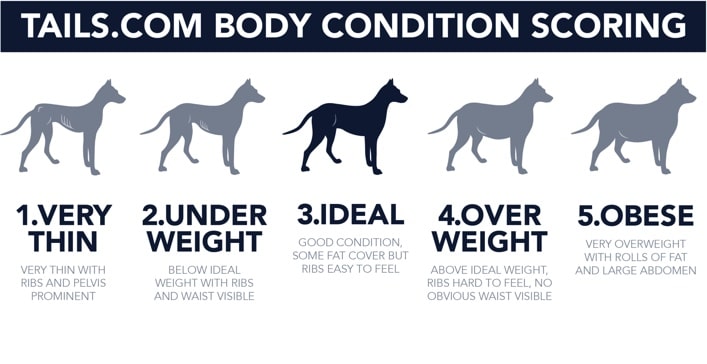
Errors of misperception of body condition are reported to occur in up to 93% of dog owner’s and 88% of cat owner’s assessments of their pet’s weight. Misperception is a known issue in human obesity medicine. It is defined as the mismatch between our perception of body shape and actual body shape or condition. An interesting study found that owner misperception persists even after owners are taught how to use a chart with a simple five-point scoring system to rate their pet’s body condition.
Despite the majority believing the scoring system had improved their ability to estimate correctly, approximately 65% were incorrect both with and without the chart. No surprise, the error of underestimation occurred approximately 90% of the time, both with and without the chart. So the research shows that using a scientific method does not improve the accuracy of pet owner’s perception of their dog’s body shape, despite the accompanying perception that it does.
The dogs aren’t opening the fridge door themselves!
It’s a rare patient who is unhealthy specifically as a result of something an owner is doing or not doing. Since you are reading this, you are obviously concerned, educated, and wonderful pet parent! If your dog or cat’s weight is causing you anxiety, read on to learn more about the complex relationships between food, pets, and their owners. But first, relax! Both pets and people deserve a body positive outlook on life. Dogs and cats come in all shapes and sizes and they are all naturally beautiful!
Pet owners should never feel judged or shamed by their veterinarian. Owners are showing their love through food. Pet obesity experts are beginning to realize that pet weight control involves the complex interaction of many factors. Causes of pet obesity involve the deep emotional and psychological bond between humans and animals.
Many of us humans have significant issues with respect to food, exercise, and our ability to control the myriad of factors that contribute to a healthy lifestyle. So, it is natural to struggle a bit with feeding our pets. Since reputable nutrition information can be hard to find, we recommend you visit Tufts University School of Veterinary Medicine Clinical Nutrition Website. It is an excellent resource to learn about nutrition basics and the best foods and feeding regimen for your pet.
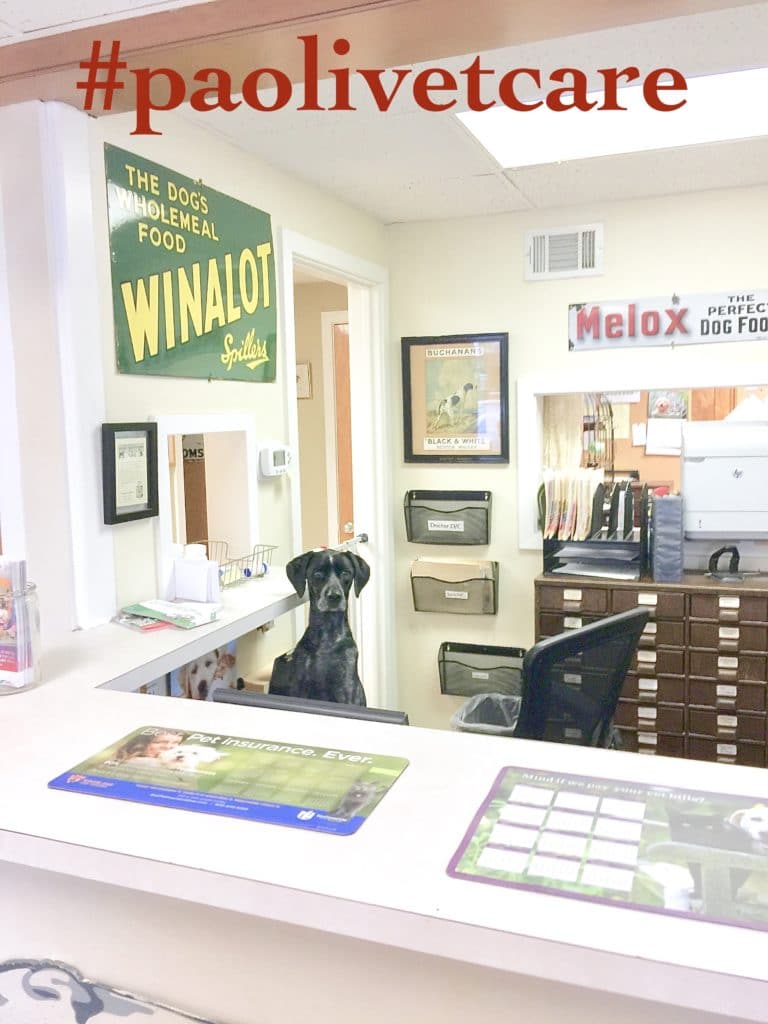
It’s Complicated!
A number of factors contribute to the difficulty of managing a pet’s weight. Many people feel they are not in control of their pet’s feeding behavior (stealing food) or in control of the behavior of other members of the household (sneaking food.) You may want to take your dog to exercise off-leash, but are afraid of encountering a large, aggressive dog at the dog park. Many studies have shown the extensive human health benefits of owning a pet. Certainly dog ownership encourages us to go outside and get more exercise. While owners do not need to specifically exercise their cat, time spent playing with a cat has psychological benefits to both the cat and the owner; with the bonus benefit of being a proven method of weight control.
Often there are other people in our homes that have a different approach or assessment of the necessity of changing their behavior. People want to show affection by giving treats and often feeding is a part of a regular routine of the owner-pet relationship. For example, human food may be shared as a part of the routine preparation of the evening family meal.
Owners feel good giving human food to their pet, so the treat-giving is reinforced. Chances are that the heavier your pet is, the less you feeI in control of their weight. The vast majority of owners feed treats to their pets, but mass media hypes the association between treat-feeding and overweight dogs and cats causing well-meaning pet parents to feel unnecessarily guilty. Treat-giving is positive and beneficial and feeding pets is an expression of our love and care for them. Vets understand—you should never fret about a visit to the vet!
Consider Joining the Paoli Vetcare Family
We invite you to meet Dr. Jay Rowan— the best-reviewed veterinarian on the Main Line. You can book an appointment online now. If you’d like to support our animal hospital, please shop for your pet food and medications through the Paoli Vetcare Online Pharmacy.
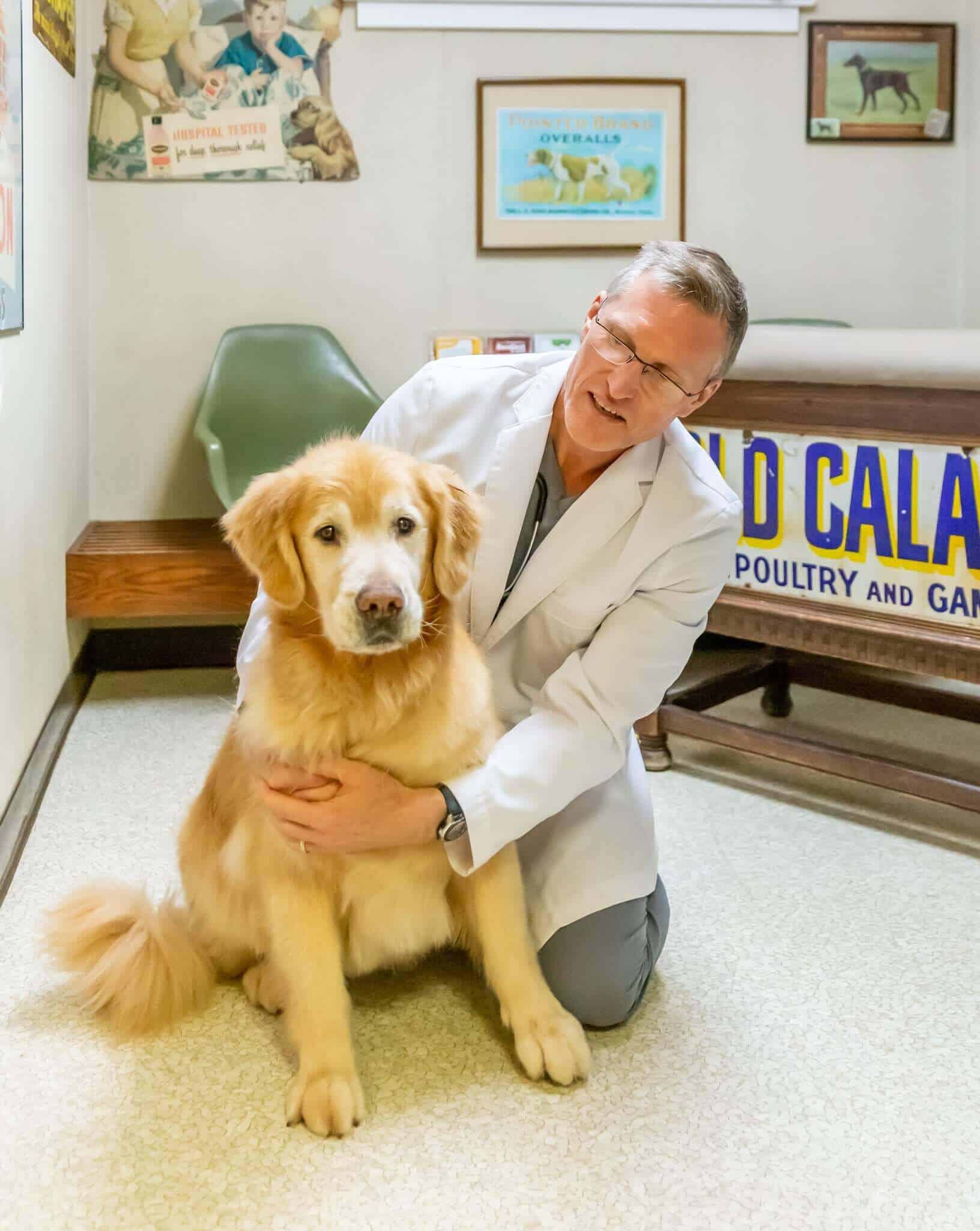
Dr Rowan always does a thorough exam
